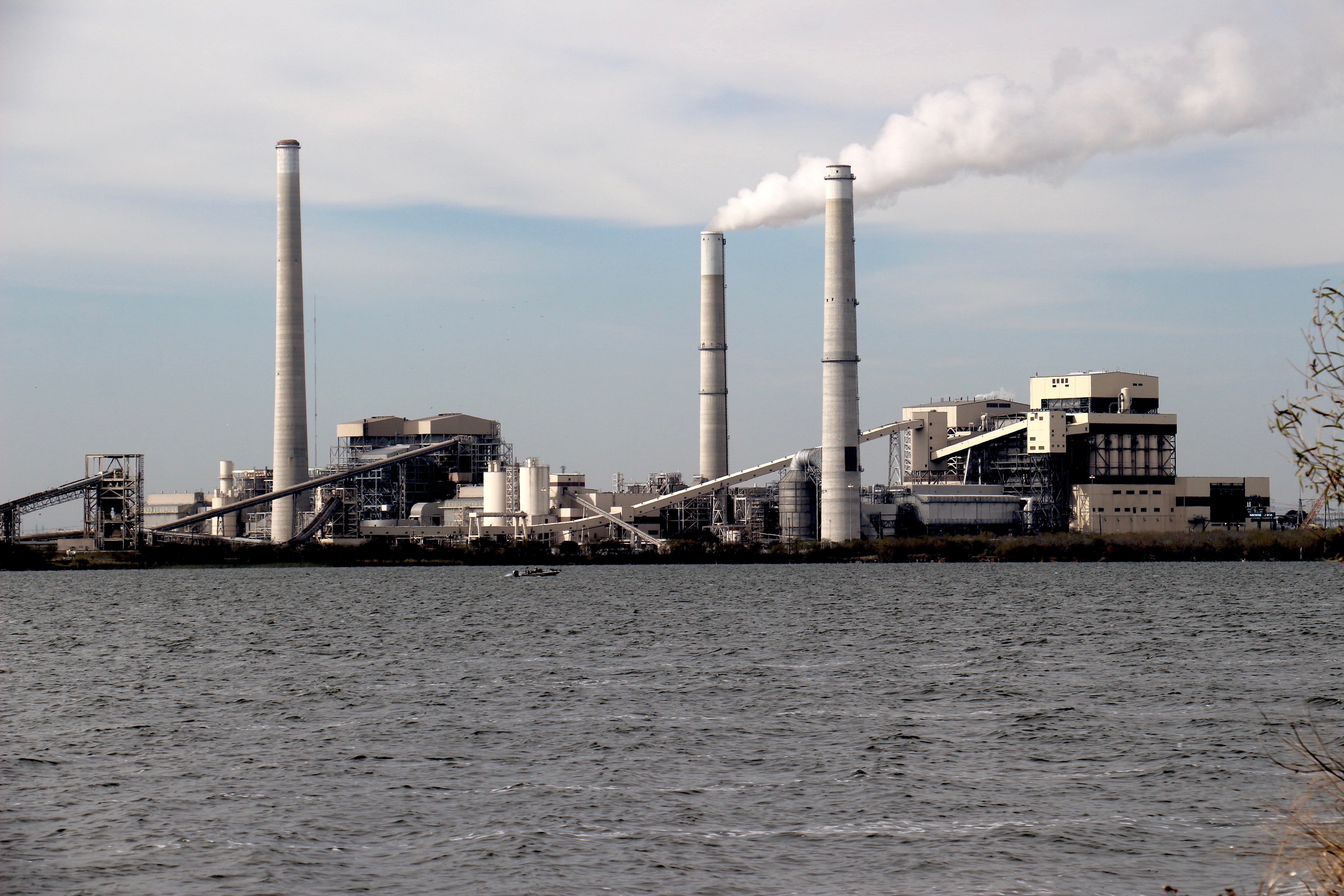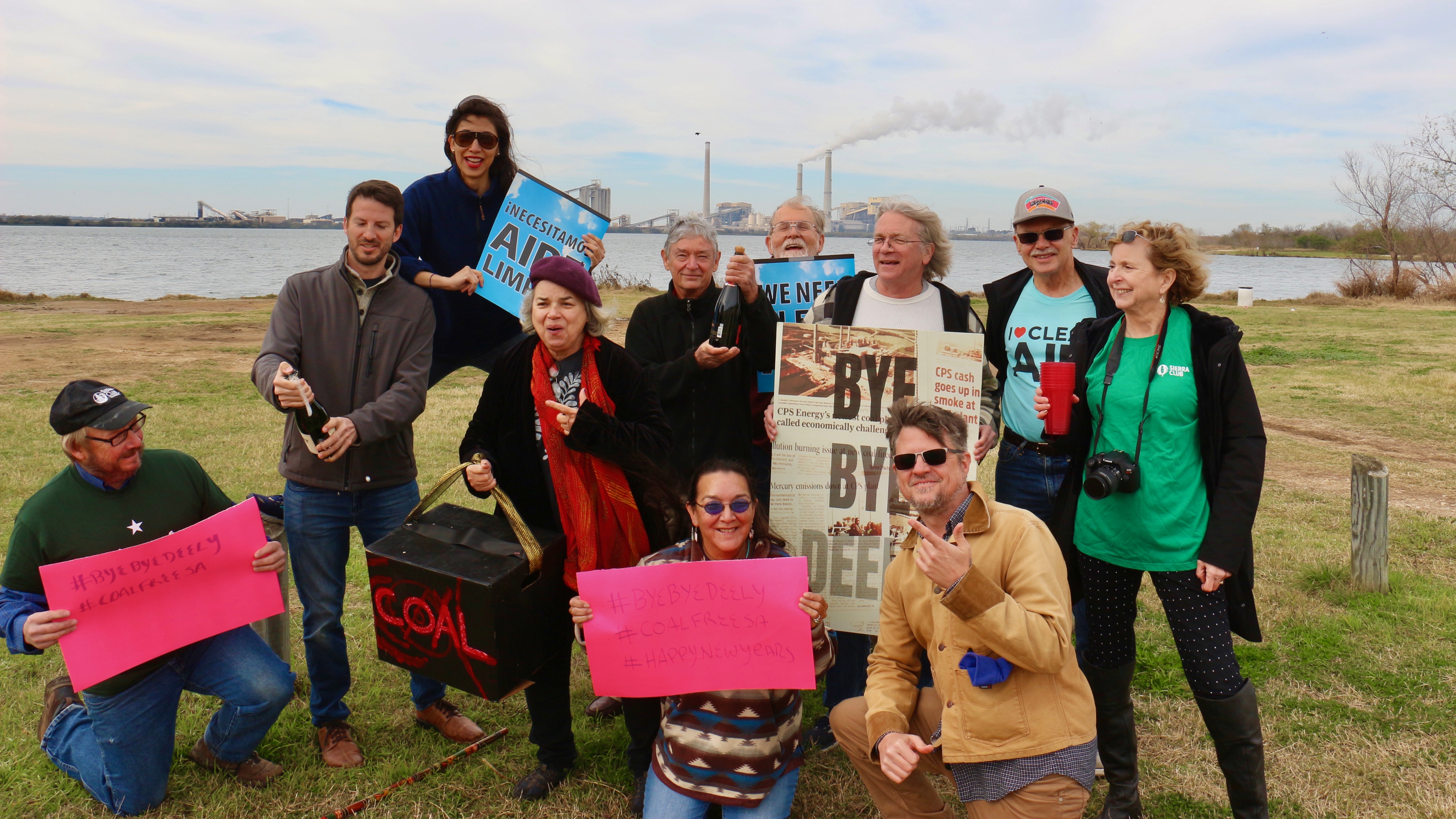By Marisol Cortez & Greg Harman

The tables were laid out with tamales and sangria (not to mention gluten-free vegan cupcakes), the walls covered in news articles telling a lengthy story of resistance. Inside Galería Guadalupe on San Antonio’s Westside, dancing feet shared time with celebratory speeches by community leaders, all to mark a momentous occasion: the beginning of the end of San Antonio’s coal age.
In just a matter of days–on December 31, to be precise–the City-owned utility would finally shutter 40-year-old, 840-megawatt J.T. “Dirty” Deely–and local residents, many of whom had dedicated years of concerted engagement to closing the plant, couldn’t wait to throw the behemoth a retirement bash.

Efforts to shut down San Antonio’s oldest and dirtiest coal plant date back more than a decade and were cemented in a 2011 deal struck between the environmental community and former CPS Energy CEO Doyle Beneby, which allowed the utility to avoid paying millions for pollution-reduction technologies in exchange for early closure.
On December 15, nearly 200 celebrants from a wide swath of San Antonio’s environmental, climate, youth, and justice communities gathered for a four-hour “shutdown getdown,” an evening of potluck-swapped food and drink, coal-fight war stories, and dancing to the conjunto funk of Los Nahuatlatos and The Indigenauts.
As captured by the welcome text posted at the front of the gallery:
“We can’t take back the thousands of childhood asthma cases, premature deaths, and coal-connected heart attacks inflicted during these years of waiting. There’s no recalling the tens of millions of tons of globe-warming gases emitted between then and now.
“But what’s not to celebrate in the closure of a beast like this, the largest emitter in the San Antonio region of brain-poisoning lead and mercury? What’s not to dance to?”
Karla Aguilar of the Tap Pilam Coahuiltecan Nation offered the opening blessing, expressing “gratitude and encouragement to those of you who have been doing this work to shut down the Deely plant… and my prayers that it can be the first step in the right direction, to increase the dialogue in San Antonio and our region to understand that this is just the first step.”
Crucially, her blessing acknowledged that “all of those ones that are putting in the work have an understanding that the insurmountable cost of climate change is outrageously more than the growing pains of shifting to a green economy.”
A press conference followed, with multiple speakers emphasizing that while the Deely closure is a major victory for environmental justice and public health, it is more significantly a way station in the current, ongoing effort to force the city to craft a climate plan that commits to closing down all coal plants by 2025 and transitioning to all renewable energy by 2030. As stated by Briauna Barrera of Public Citizen and the Climate Action SA coalition:
“The battle to close Deely has been won, but the war for a fossil-free future continues. The City of San Antonio is leading an effort to create a climate plan, but a truly effective climate plan means shutting down all our coal plants and all of our natural gas infrastructure and rapidly transitioning to renewable energy. It means shifting priorities from those of endless growth to those of stability and sustainability. And it means redistributing resources.”
Following the blessing and press conference, a celebratory dirge and procession organized by climate justice artivist Alice Canestaro-Garcia and choreographed by decolonial dancer Fabiola Torralba officially kicked off the party, leading participants into the gallery space (see final few minutes of video above, after press conference speakers).
Yet as integral as fighting words or creative resistance were to the celebration, the heart of the event (for this liberation sociologist as least) was its documentation of the deep history bound up in the hearts and bodies of folks who participated, in many cases from the beginning, on the frontline of the long, slow struggle to close Deely.
Though we missed several oral histories, including those of long-time Sierra Club activists Loretta Van Coppenolle and Jerry Morrisey, here are two we did capture, one from Karen Hadden of the SEED Coalition (who discussed the Deely closure in the context of several other, overlapping dirty energy fights) and the second from environmental attorney Enrique Valdivia.
[For video testimonies: See https://deceleration.news/2019/01/06/cps-deely-coal-climate-action/]
These testimonios were further complemented by a small exhibit posted to the gallery walls, compiled by Russell Seal and Peter Bella, with archival materials and photographs detailing the fight against Deely but also those against the younger J.K. Spruce coal plant and the South Texas Nuclear Project.
Listening to these stories, bumping into people we have worked alongside at various points but haven’t seen in years, remembering the intimacy of that work, recognizing those we know in photographs and newspaper articles, recognizing ourselves as a part of the histories recalled (and in some cases as documentarian)—we discover that if this is a story about energy descent, it is equally one about the long horizons of struggle and the relations of friendship and solidarity that emerge in the process.
And if it is an effort to document what happened and what we accomplished, it is also a reminder of how much of the story of that struggle remains within us, untold or unheard, to be recorded or written down or summoned forth in dance or song or prayer. And, equally, if it is the celebration of an ending, it is also the ceremonial recognition of what begins and continues—of the work that remains.
…
Deely’s last gasp arrived on December 31, 2018. A few of us got word of a TV truck prowling toward Calaveras Lake. New Year’s Eve champers in hand, we went into pursuit to make sure that local media, which had largely ignored the community story behind Deely’s demise, took proper notice. And as the News4 van returned to basecamp SA with a story of our lakeside toasting, we also double downed with more of our own documentation.

An interesting (and sobering) postscript has emerged from this hard-won local media coverage. Those who labored long and hard to close Deely fully expected that its post-retirement plans would be limited to fishing in Calaveras Lake (watch out for that mercury, tho) and engaging in karmic repair by volunteering with the American Lung Association. But as made clear in KSAT 12’s interview with current CPS Energy CEO Paula Gold-Williams, the city’s public utility is having a hard time letting go of the utility’s fossil fuel addiction—and an even harder time registering the community’s framing of Deely’s closure in terms of climate justice and public health rather than dollars and cents.
In spite of recent promises by CPS Chief Operating Officer Cris Eugster that CPS “will not be building a large base-load power plant again,” Gold-Williams has instructed staff to explore how much it would cost to convert the structure into … wait for it … a natural gas plant.
“We are having to do quite a bit of analysis,” she told KSAT reporter Sarah Acosta this week, “because once you use that footprint for coal, it’s pretty challenging to convert it to a gas unit. But we are looking at it to see if the economics of it do work to do something else with that unit.”
The former utility financial officer hasn’t quite gotten the lay of the land when it comes to the severity of our current climate crisis. Neither does she own up to the fact that coal kills.
Shutting down Deely, she told Acosta, was the right decision “from an environmental standpoint.” Not, we must point out, from a public health standpoint. And the future, she insists, “will be focused on gas and then new technologies coming down the pipe,” rather than the already existing clean-energy technology or carbon-free goals already under discussion in the city’s climate planning process.
And so, we continue. Another day; another tango.
The re-education of Paula Gold-Williams begins now.
Marisol Cortez and Greg Harman are co-editors of Deceleration.news, an online journal that responds to our shared ecological, political, and cultural crises, writing at the intersection of climate change and social justice–journalistically, academically, and creatively.